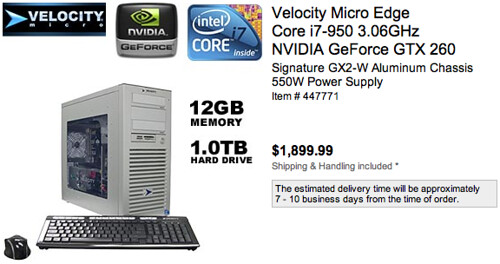Pretty big week in computing last week - Apple announced great financial results, and then released new Macs. And some other software company up in Redmond had a new release, which triggered a wave of new PC releases. In general, Apple remains fairly competitive with the Macintosh line, but I'm going to take a look at two places were Apple's pricing doesn't make as much sense (due likely to their own internal marketing decisions).
Mac mini
In a slight surprise, Apple revised the Mac mini, giving it faster CPU options, more base memory, but unfortunately not a lower price. The big news on the Macintosh front was the new iMac, with new industrial design, and much faster components across the board. I'm interested in acquiring a new machine, so I've been poking around, comparing the new Mac mini to the new iMac. Here is an overview of a BTO Mac mini, if you max everything out:
This is a Mac mini spec'd out with the fastest CPU (2.66Ghz Intel Core 2 Duo), biggest hard drive, and the new Apple wireless keyboard and mouse. That price of $1,187 seems pretty high, for the hardware that you get. And it is, if you compare against the base iMac:
As you can see, for a mere $12 more over the BTO Mac mini, you get a faster CPU (3.06Ghz vs. 2.66Ghz in the mini), and one other feature — a monitor (and a pretty nice one to boot). Clearly, the iMac is a much better deal. It's not clear why Apple is so aggressive on iMac pricing, and so lax on Mac mini pricing. I don't see the advantage to Apple if I buy a Mac mini versus an iMac — as long as I'm buying a Mac, shouldn't Apple be happy?
So is the Mac mini a bad deal? I'd say it is if you're looking for the highest-end mini that Apple sells. However, if you have more modest needs (and don't want the wireless Apple keyboard and Magic Mouse), then the mini is still a fantastic way to get into the Mac. But if you need a monitor with your new machine, you're probably better off doing what Apple wants you to do and going with the iMac.
Mac Pro
In an ideal world, my next computer will have 4 cores, 8GB of memory, a user-replaceable hard disk, and a non-glossy display. As a result, for the last several months I've been pondering making the jump to the Mac Pro. However, Apple didn't revise this machine, and unfortunately the base model Mac Pro (single 2.66Ghz quad core CPU, 3 GB of memory, 640GB disk) remains the worst value of all of Apple's Macs. Note that I think that the 8 core Mac Pro is probably a pretty good deal — whenever you have to go to a dual CPU configuration, then you're in a workstation class machine, which isn't going to be cheap (and Apple is in fact pretty competitive here, compared with the rest of the industry).
However, as far as I can tell, there is no performance difference between the desktop-oriented Intel Nehalem-based Core i7 CPU, versus the server-class Nehalem-based Xeon CPU. However, there is a big price differential, which in part is what has lead the base Mac Pro off the rails.
I'm fine with paying more for a Macintosh, but I'm not fine with paying a lot more, for a machine that isn't as good. Here's an example of a machine that's competitive with the Mac Pro, which I found at Costco:

Velocity Micro Core i7-based machine at Costco
This machine from Velocity Micro is better than the entry-level Mac Pro in just about every way — it has 4 times the RAM, nearly double the disk, a faster CPU, and a much faster NVIDIA graphics card. Oh, and it's $600 cheaper. And I didn't even surf this up very hard, I'm sure that there are even better deals that can be found on Core i7 based machines.
In sum, the entry-level Mac Pro is just not a good deal, no matter how you slice it. Thankfully, Apple now offers a high-end iMac with a Core i7 CPU, which makes Apple a bit more competitive for 4 cores, but Apple really needs to fix the entry-level Mac Pro. They either need to drastically drop the price, or they need to raise the RAM, disk, and graphics card, to make a truly high-end machine. Ironically, the entry-level Mac Pro would be better served if Apple raised the price, in order to deliver a machine with better specifications.
So, my search for a new computer continues.
-Andy.

